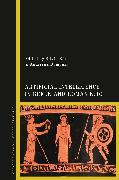- Start
- Artificial Intelligence in Greek and Roman Epic
Artificial Intelligence in Greek and Roman Epic
Angebote / Angebote:
This is the first scholarly exploration of concepts and representations of artificial intelligence in ancient Greek and Roman epic, including their reception in later literature and culture. Contributors look at how Hesiod, Homer, Apollonius of Rhodes, Moschus, Ovid and Valerius Flaccus have elaborated on the first literary texts that deal with automata and the quest for artificial life as well as technological intervention improving human life.
Parts I and II consider, respectively, Greek, and Hellenistic and Roman epics. Contributors explore the presentations of Pandora in Hesiod, Homeric automatons such as Hephaestus' wheeled tripods, the Phaiakian king Alkinoös' golden and silver guard dogs, and even the Trojan Horse. Later examples include AI and automation in the Argonauticas of Apollonius and Valerius Flaccus, and Pygmalion's ivory woman in Ovid's Metamorphoses.
Part III underlines how these concepts benefit from analysis of the ekphrasis device, within which they often feature. Chapters investigate the cyborg potential of the epic hero and the literary implications of ancient technology. Moving finally into contemporary examples, the final chapters consider the reception of ancient automation in contemporary film, for example the sci-fi epic Starvoyage, or Small Cosmic Odyssey (1995), and The Holy Machine by Chris Beckett (2004).
Noch nicht erschienen, Juni 2024


